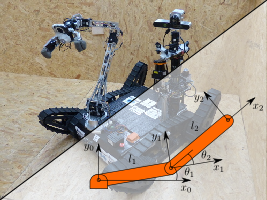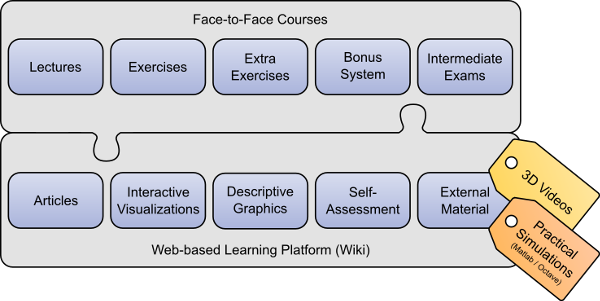New E-Learning Elements for Student Support and Practical Experience
 |
 |
 |
IntroductionDuring the first semesters of Bachelor's as well as of Master's degree programs, students are often missing specific mathematical knowledge and competencies required to work with the technical course contents. One such an example from the Bachelor's degree program of electrical engineering (and closely related programmes) is the course Fundamentals of Electrical Engineering A provided by GET Lab. In particular, the course covers the spatial and time-dependent description of electromagnetic fields based on integral equations with respect to curves, surfaces and volumes in 3D space and in different coordinate systems. Such subjects lead to major difficulties for many students and are discussed only later in mathematics courses in subsequent semesters, often without technical contexts. Further challenges arise from different mathematical backgrounds and restricted self-learning competencies.Development of E-Learning ElementsIn order to address these challenges and to support the students' learning process, new e-learning elements are continuously developed and evaluated in GET Lab. For the course Fundamentals of Electrical Engineering A, a web-based learning platform based on a Wiki is used (GET A Wiki) to implement a blended learning scenario. On the one hand, the Wiki is used within the face-to-face courses for short excursions. On the other hand, students are frequently in contact with the platform and therefore motivated to also work with the Wiki outside the face-to-face courses to close individual knowledge gaps. This takes account for the students' different mathematical backgrounds. A visualization of the approach is shown in figure 1.
Enhancements for Masters's Degree ProgramsSimilar challenges arise in the course Robotics which is also provided by GET Lab and part of the Masters's degree program of electrical engineering (especially Electrical Systems Engineering). The course is particularly attended by international students who have heterogeneous prerequisites and different mathematical backgrounds due to varying syllabuses of different countries. As a result, the Robotics Wiki has been developed to implement a blended learning scenario analogously to the GET A Wiki. Here, the approach considers the difficulties of international students and thereby facilitates internationalization of corresponding degree programmes.The key subjects addressed in the Robotics Wiki are related to the kinematics and dynamics of mobile robots and robot manipulator arms. For instance, students require in-depth mathematical knowledge in linear algebra and quaternions to determine translation and rotation parameters in 3D Euclidean and other spaces. Besides mathematical key subjects which are covered with respect to the technical course contents, the Robotics Wiki also focuses on specific technical subjects and practical experience. For this purpose, the wiki integrates a framework to directly execute Octave- or Matlab code in the browser and without any additional software. For example, forward kinematics can be calculated directly and serial link manipulators can be simulated and visualized. Further goals of the Robotics Wiki are the attraction of students worldwide to the field of robotics and corresponding degree programs as well as propaedeutic online-assessments. The following video shows some examples from the e-learning elements developed. Awards and FundingBased on the recommendation of the Commission on Teaching, Studies and Quality Management of the University of Paderborn the Award for Innovation and Quality in Teaching was granted for parts of the development of the e-learning elements.Further funding for parts of this work was granted by the Stifterverband für die deutsche Wissenschaft, Daimler-Fonds and Daimler und Benz Stiftung within the initiative MINTernational Digital. For systematic discussions and enhancements of the e-learning elements, GET Lab is also affiliated with the Competence Center University Didactics in Mathematics (KHDM). Selected References
ContactDo you have any questions or comments? Please contact: |
